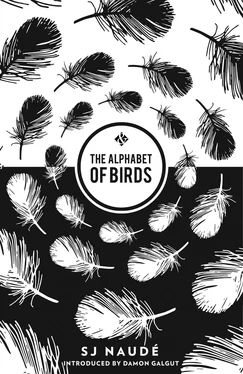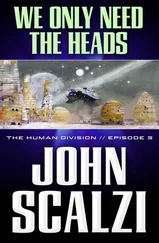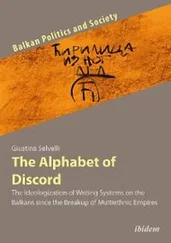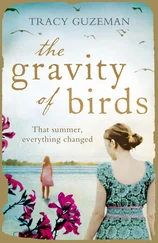He tells Sam of a dance performance he once saw in a European city. A Dutch choreographer. A piece for two dancers and a cameraman. The dancers dance, the cameraman moving around them. The image is transmitted to a large screen at the back of the stage: a doubling, the video image delayed by half a second. While they are dancing, the dancers can see themselves, can observe their own movements of a moment ago. The cameraman’s movements become increasingly complicated. He gets down on his back beneath the dancers, they bend around him, become trapped on each side of him. Then the dancers leave the stage, dancing down the aisle, the cameraman following them, to the foyer, where they continue. All that is left for the audience in the auditorium is the video image. The male dancer suddenly disappears through a side door. The woman stops moving, standing still for a moment while looking right into the camera (the image on the back wall of the stage is one of desolation, bewilderment). Then she turns around and walks out the auditorium’s main entrance, leaving behind the cameraman and the audience. The last image is of her — a lonely figure — walking down the street, where a row of cherry trees is in full bloom, becoming smaller until she disappears.
‘What about her ballet shoes on the tar?!’ Sam wants to know. He is smiling.
Sam clearly likes the story. His arms are moving with excitement.
‘Let’s move a little,’ Sam says. ‘Let’s loosen up.’ He gets up, shakes the fingers of both hands, hopping, crunching the grass beneath his soles.
He shakes his head. ‘No, I think my joints have grown stiff over the years, or perhaps the rigidity is genetic.’
Sam pulls him up by the hand. ‘Just let go,’ he says, ‘there’s no body that can’t loosen itself. Nobody’s genetically stiff. You have strong muscles on your skeleton — just let them move. Just work out your body’s patterns. You should leave behind all the gym nonsense; the weight of weights settles into your muscles after a while.’
He stands there sheepishly, self-conscious in Sam’s sphere of movement. Sam shakes and flaps his own body. He makes a half-hearted attempt himself, like an injured bird.
Sam stops. ‘Ok, let’s start with the hands,’ he says.
They take their positions opposite each other, hands between them. They are looking each other in the eye. The hands start moving. First slowly, tentatively. Then faster, more naturally. The hands evade, search, play, lead each other, grab at each other, push and pull and bend and weave the air, turn around, flit and slip around each other, towards each other, mimicking each other. The knuckles click against each other, the nerves in the fingertips tingle, sending swift messages, the fingers become claws, projecting shadows onto each other, following and chasing each other, nails flash, smaller and smaller movements, faster and faster, a tiny gale is being stirred up, a cloudlet of electricity, until the hands simultaneously come to a halt and hold on to each other crossing each other. The frequencies of their vibrations are now close. Their palms are burning, as if a chemical reaction has been catalysed. The entropy is high, their hands are about to sublimate to gas. A bird with toxic green wings appears, hovering right by their faces, whirring frantically to keep still, a sugarbird perhaps, sensing that nectar is to be found in the air between them.
Still looking him in the eye, he asks Sam: ‘What are we loosening ourselves for, what are we preparing for? What is the main performance? What,’ he continues, Sam’s eyes soft as a doe’s and his skin like quicksand, ‘if you let the muscles go and then never regain a grip on them? What if they then have their own existence?’ A life of staggering, he thinks, of non-coordination and dissolution.
Sam says nothing for a while. He withdraws his hands and sits down, resting his chin on his knees, rustling with his fingers in the dry grass.
‘Last year,’ Sam says, ‘I was sitting just like this on a beach in the Transkei. Camped out there with friends. Just slept on the beach, ate stuff from the sea. Became a nature boy. We ate shrooms almost every day …’
‘Shrooms?’
‘Magic mushrooms. For days on end I sat there, just like this, hands in the sand, speaking to God. Many of my moves still come from those conversations.’ He looks up. ‘Nothing wrong with dissolution.’
After a brief silence, he smiles and adds: ‘Later we realised there were worms in the shrooms.’
In between Sam’s classes at the university, they spend time together. They drink tea, see films. He is here on sabbatical, has interrupted his professional life in New York for a while. Before meeting Sam, he was often at a loose end, searching for meaningful ways to spend his time. Every now and then he had to flee to his flat in Cape Town to escape the emotional intensity of the renewed involvement with his family.
He cannot help but observe himself, by Sam’s side, from an ironic distance, with an amused half-smile. He is approaching middle age, Sam is not much more than a child. But then: there is wisdom beyond age in Sam’s body. He has startling knowledge in the blood.
They go to a hairdresser. He watches as Sam gets his hair cut. The hairdresser has draped a black cloak around him, pulled it in around his neck. It billows, as if filled with wind. Locks fall on the floor. On impulse he bends over and surreptitiously slips one into his palm. When he looks up, his eye catches Sam’s in the mirror. Sam’s staring eye, unseeing. Sam’s body stiffens and he falls off the chair, shuddering a few times. His legs are jerking, hair clings to his trousers. He kneels down by Sam’s side. He immediately grasps it is a fit, but does not know what to do. He holds his hand under Sam’s head to stop it from banging against the floor. When Sam surfaces, the hairdresser is standing over him with scissors in his hand. Sam’s eyes are filled with terror.
It is not the only time that Sam is overcome by a seizure. One night, when they are sharing his bed in a guest house, Sam’s pumping knees wake him up. He holds him tight: a thrashing animal. When Sam comes to, the light now on, he tells of the dream he was having when the attack came. In the dream he was walking with a dog, somewhere on a gloomy farm. The dog disappeared behind a woodpile and started barking. He called to the dog, but it would not return. When he went looking, he found his father’s half-decomposed body behind the pile.
‘How did you know it was your father?’ he asks after a while.
‘Just knew it. Could feel it in my bones. He was a bum in rags, a hobo.’
He withdraws to his flat in Cape Town. He did not want to leave Sam behind in Pretoria, but Sam could not accompany him; he is fully dedicated to his dancing life. He cannot sacrifice even a weekend because of auditions and rehearsals. The family crises in Pretoria make his throat constrict. Nothing is moving in him now; he is a stagnant pool. For half a lifetime he was geographically removed from the dynamics in his overly happy, overly intimate family, and then with cosmic inequity, death and divorce and other forms of heartache strike the family while he is here. There is a tearing of the family tissue, right at the core. For a variety of reasons he is the one whose intervention is indicated, who must attempt to mend it. For a long time he had been planning to break away from his sapping professional life in Manhattan. He did not, however, imagine it happening like this.
He tries to get some rest in the Cape Town flat after a period of exceptional psychic demands. The attempts to become looser together with Sam were, it seems, unsuccessful. In fact, it probably made matters worse, challenging the stiffness when he was not prepared for it. He becomes agoraphobic, only ventures out every few days to buy what is essential. Sam’s messages pop up on his cellphone. He does not respond, lets his phone die. He stops reading emails, cuts off all communication. He spends his days motionless on the bed: rigor mortis on white sheets in sunlight. He stops eating, extends an arm slowly to open the window, lives on water and sunlight and air. For twelve days he descends to hell. Or, in fact, ascends to the blinding heavens. He holes himself up on the seventh floor, with an unimpeded view over the city and the bay. He stops going out at all, no longer washes himself. Makes friends, from a distance, with the pigeons as well as the homeless. He gets to know the latter’s routines. There is a man who comes at dusk, every day, to fetch his possessions from a manhole. He opens the lid in the pavement and takes out plastic bags, a sleeping bag, pieces of clothing, neatly closes the lid, his own sliver of private space. He pushes his shopping trolley up to the mountain, then down into the city in the morning, like an old woman going shopping. He becomes one with these people, if not in their lack of material things, then at least in the crumbling of the soul. (How presumptuous, he thinks later. What does he know of such suffering?) He collects small narratives that one can construct from a fixed observation point, studies the city in its shades of grey. His only conversation partners are the flocks of pigeons that descend onto corrugated-iron roofs. He calls out to them, whispers intimately to them when his limbs become heavy with hunger. The pigeons avoid his balcony — perhaps they instinctively sense his immobility, that he is earthbound. When it rains, the city appears and disappears. He observes the world through a silver sheet of water tumbling from the roof. Water and pigeons mingle with buildings and streets. His limbs let go of their weight; he is becoming light, losing substance. It is a precondition for his return to the land of the living: he must dissolve.
Читать дальше












